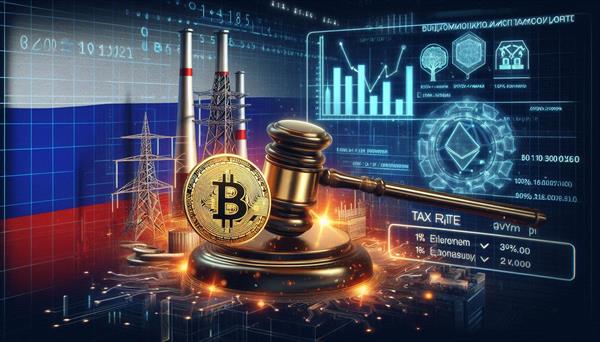Russia Recognizes Crypto as Property, Imposes New Tax Rules on Mining
Putin Signs Crypto Tax Legislation
Russian President Vladimir Putin has signed a federal law establishing a new tax framework for cryptocurrency mining while officially recognizing digital currencies as property. The legislation, announced on November 29, introduces detailed tax rules and reporting requirements for the cryptocurrency industry.

Tax Rates for Cryptocurrency Transactions
Under the new law, cryptocurrency sales will be taxed at a personal income tax rate of 13% for earnings up to 2.4 million rubles and 15% for income exceeding this threshold. Mining operations are exempt from value-added tax (VAT), but mining-related earnings will be treated as "income in kind," with their value determined by market rates.
Corporate profits from mining activities will be taxed at the standard corporate tax rate, set to increase to 25% in 2025. Additionally, mining businesses and individual entrepreneurs cannot use simplified tax systems like the single agricultural tax or patent systems.
Reporting and Compliance Obligations
Mining infrastructure operators are required to report their activities and client information to local authorities quarterly. Reports must be submitted electronically by the 25th day of the month following the quarter. Failure to meet this deadline will result in fines of 40,000 rubles. These provisions will take effect on January 1, 2025.
Legal Status of Digital Currencies
Digital currencies, including those used under Russia’s experimental crypto legal framework for foreign trade agreements, are now classified as property. This classification provides legal recognition and clarity for their use in financial and trade transactions.
The experimental legal regime (ELR) also facilitates cross-border transactions involving cryptocurrencies. Services offered by authorized organizations under this regime are exempt from additional taxation, further supporting the legal use of digital currencies.
Energy Challenges and Mining Restrictions
Crypto Mining Faces Energy Limitations
Russia legalized cryptocurrency mining in August 2024, with the law taking effect on November 1. Only registered Russian entities and entrepreneurs can mine cryptocurrency, subject to a monthly energy consumption cap of 6,000 kWh. Regions with energy shortages face stricter limitations.
On November 19, Deputy Prime Minister Alexander Novak convened a government commission to discuss further restrictions on mining activities in energy-constrained regions. These include Irkutsk, Donetsk, Luhansk, Zaporizhzhia, and Kherson. The restrictions are expected to remain in place until 2031.
Impact on the Crypto Mining Industry
These limitations could significantly affect Russia's mining sector, particularly in areas like Irkutsk, where companies like BitRiver benefit from cheap energy. Despite these hurdles, crypto demand has risen, with an 8% increase in traffic to major cryptocurrency exchanges recorded in November.
A Strategic Shift Towards Crypto Regulation
Russia's latest move to regulate the cryptocurrency industry highlights its adaptation to the global shift towards digital currencies. The introduction of clear legal and tax frameworks underscores the country's intent to align with a decentralized financial future.





